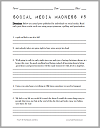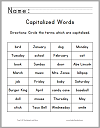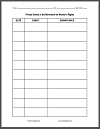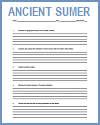| Share the learning joy! |
High School Graduation and College Acceptance Requirements: Guide for Students |
Plus General Advice on How to Succeed and “Not Be Stupid” in High
School |
Required Courses and Electives |
Each state–even each district within a state–has its own set of requirements for a high school
diploma. Many states also require that students pass a proficiency examination. To find the
requirements for your area, try internet searches such as “Montana Board of Education.” |
A school district website may display a chart like this: |
|
The “credits” typically translate into
“years.” In the example above, the student must complete three
years of English (English I, II, and III), a semester
(half-year) of Health, two years of math, etc., in order to earn
a basic high school diploma. “Electives” are courses that you
get to pick–drama, music, painting, etc. |
Remember that these required courses are
for a basic high school diploma and will not, on their own,
necessarily gain you admittance into college. State universities
and community colleges which accept students who have taken only
these basic courses will require remedial coursework. This means
that if you don’t take it in high school, you have to take it in
college. High school classes are basically free and usually
easier than their college versions. The question then is,
“Should I take a third or fourth year of math for free as a high
school student, or pay $100-$2500 to take a required math course
in college?” |
To avoid remedial college classes, and to
get into a more exclusive university, a student should follow
the college preparatory (“college prep”) curriculum. This
basically amounts to four years of all core subjects–English,
math, science, and social studies–along with numerous electives,
often with a focus on a certain area of student interest. A
college-bound student should take at least two years of a
foreign language and a fine arts course (such as painting or
general art). |
More about Electives |
For electives, a student may choose a music
or fine arts course as an elective each year. As stated,
electives should cluster around an area of student interest.
Music lovers should be encouraged to take choir, band,
orchestra, etc. It is irrelevant to colleges’ offices of
admission whether a student has taken four years of band or has
taken a different music course each year. Really, it is fine to
take electives which are “all over the place.” The point of
electives is to round out the student’s education and illustrate
that he or she has a range of interests. |
Another thing to consider when choosing
high school electives is how the course might help you. Can you
type? College courses (and many jobs) require a lot of typing.
If you cannot type well, a basic typing/word-processing course
might be a good idea. What are you interested in for college? If
you think you might go for a business degree, take electives in
economics and office skills. |
Whatever you do, do not waste time in a
study hall unless you absolutely, positively need the time for
studying (because of sports or clubs). |
More about Foreign Languages |
Take a foreign language, preferably for
four years. Don’t just show up to class–make a genuine effort to
learn the language. If you take French and the teacher plans a
trip to Quebec, France, Haiti, or somewhere else French is
spoken, go on the trip. Proficiency in a foreign language will
help you no matter what job you have. Most American corporations
have offices overseas. Local companies have foreign-born
customers. Speaking a foreign language will put your résumé at
the top of the pile for pretty much any job. |
Clubs and Organizations |
You may have heard from friends and family
that you should join as many clubs as possible to make your
college applications look good. This is true, but only to a
certain extent. You should not join every club, group, team,
etc., because you simply will not have the time. You are better
off selecting those clubs which interest you the most and
putting some real effort into your membership. |
You are better off devoting a lot of time
to a particular club than showing up to half of the meetings for
six clubs. Why? You want to be able to tell a college what you
did with the club. You want to be able to say, “I spent two
years in Drama Club where I helped organize presentations at
local senior centers. I acted in the ‘Seeing Shakespeare’
troupe, playing numerous roles in a montage of the most famous
scenes from Shakespeare. I not only participated in the group,
but I helped plan our funding campaigns by working with local
businesses and holding fundraisers within my school.” |
Groups outside of School |
Many universities will ask if you have
participated in activities outside of school. Warning: Church
and ethnic organizations typically do not count. If you teach
Sunday school or volunteered at the Polish festival, good for
you–but this information does not belong on a college
application. Colleges are looking for secular (non-religious)
and inclusive (not ethnic) activities. To fulfill this
college-entrance requirement, try volunteering as a reading
tutor at your local library, or working as a candy-striper at a
nearby hospital. |
Dealing with Teachers and School
Staff |
Let’s be honest–teachers can sometimes be
difficult to deal with. Sometimes, the work seems stupid. But
remember that come senior year, you are going to be asking your
teachers, coaches, etc., for letters of recommendation. If you
rolled your eyes in class all year and complained about the
teacher, the teacher is not very likely to give you a letter of
recommendation. And trust us–teachers have “super hearing.” You
may think they can’t hear you mumbling, but they can. Just don’t
do it. Save your complaints for when you are alone with your
friends. Spend classroom time trying to impress your teachers so
that they think you’re terrific. |
College Applications |
There it is–senior year, and you are
looking at a college application and thinking, “I have nothing
to write on this.” Here is a trick that works not only for
college applications, but job résumés and all sorts of things. |
As a freshman or even eighth-grader, do an
internet search of various colleges. Print up their application
forms. What are the admission requirements? What kinds of
personal questions do colleges ask? Does a particular college
want a copy of a paper you have written? Spend your high school
years completing these college applications. Make sure that you
do and accomplish things that will fill up all of the lines and
boxes on the applications. If your top pick college wants to see
how well you can write, save your old school papers. The idea is
that you do not have only a few weeks during your senior year to
complete a college application–you have nearly four years to
work on what you are going to write. |
Careers after High School |
Even if you are not planning on going to
college, the “College Applications” trick can work for you. Look
through the employment listings in your local newspaper. What
skills are employers looking for? If you hope to get an office
job, you may notice that most office ads require skills with
Microsoft Excel, typing, etc. Be sure to take these courses as a
high school student if your school offers them. |
If you are planning to go to college after
high school, chances are that you will need to find a part-time
job during your college years. Would you rather round up
shopping carts in a parking lot for minimum wage, or work in a
nice office at a decent salary? Electives offering basic office
skills might be a good idea. |
MySpace, Facebook, Blogging, and
Your Life on the Internet |
“It is better to be thought a fool than to
open your mouth and remove all doubt.” – Abraham Lincoln |
Let’s be honest–Tumblr, Facebook,
blogging, IMs, etc.–they are all fun. In the modern internet
age, it is nearly impossible to stay in touch and connected to
people without using at least one of these things. However, you
have to be careful. We’re not going to warn you about dangers
from online predators or anything like that; we assume that you
have already been told. We are going to warn you about online
risks that you may have never considered before. |
Anything that you put on the internet is
available to the public unless you take precautions. Even when
you have taken precautions, things can happen. |
Start thinking about your “online persona”
this way: What would happen if your parents, teachers, or a
college admissions office saw your profile or blog? Are you “Googleable”?
That is, if someone typed your name into a search engine, would
they find things you have published on the internet? What do
these things say about you as a person? |
Most of us act different ways around
different people. We know better than to cuss around our
parents, but might not think twice about saying bad words around
our friends. Although we are certainly not advocating the use of
foul language, acting differently around different people is
perfectly normal. It’s not “acting fake,” but is part of our
basic social skills. Changing how we act to fit a group, unless
it involves doing something harmful or illegal, is a good and
natural thing. |
Where does the internet fit into this? When
we log onto a site like MySpace, we are typically trying to
connect with our friends. We assume that only our friends will
be looking at our profile. Very quickly, we find ourselves
chatting and posting with friends in ways that we would in real
life. However, MySpace is not a private conversation. It is open
for anyone to look at and read. |
Picture this: You are a senior applying to
college. The college knows your name and email address. The
college uses your name and email address to search for you on
MySpace. The college finds your profile where your friend has
posted: “LOL I got the test answers so copy from me at lunch.
kegger at josh’s Friday.” This may seem a bit extreme, but it is
extreme to prove the point. You definitely should not be
cheating or drinking alcohol. You may not even plan to cheat or
drink, and might think your friend is an idiot for posting this
on your comments page. But does anyone else know this? The
college looking at your MySpace page is going to assume that you
are an under-age cheating drinker because that is the way you
appear–that is the “online persona” the world sees. |
Speaking of “picture this,” what of your
pictures? Did you know that even with a private profile, most
pictures can be found by searching Google Images? Once your
photo has been posted on the internet, you no longer have
control over it. That picture could turn up years later on a
website you never imagined. Every time you post a picture,
imagine that picture landing on the desk of your teacher or
boss. If you think the picture might get you in trouble, do not
post it on the internet. |
Try this: It should go without saying that
you should not be doing anything online that might embarrass you
if your parents were to see it. You should not be drinking,
cheating, etc. But just in case you have a snotty friend who
posts inappropriate comments on your page, (1) make your profile
private to all but your friends. (2) Do not publish every
thought that enters your head. Remember the old adage: “Never
write anything down that the whole world can’t read.” (3) Do not
use the internet to attack people, either as yourself or
anonymously. It can be illegal. You cannot pretend that you did
not say something that has been published. The police and other
officials can find what you wrote, even after you have deleted
it. You can be tracked down even if you posted anonymously. Just
don’t do it and you won’t have any problems. (4) Do not bad-talk
your peers, teachers, employers, etc. It really has happened
that people have lost their jobs after employers found out these
people were blogging about how much they hate their jobs/bosses.
(5) Never ever post pictures of yourself that you could not show
to your parents and teachers. |
Have you ever heard the saying: “Three can
keep a secret, if two of them are dead”? Publishing things that
only your friends can see does not keep these things private.
You may not share passwords, but your friends might. Having a
private profile is a hope, not a promise. You can hope that only
your friends see your profile, but there is no guarantee. Be
careful what you put out there. |
High School and College Plan |
Following these steps will help you get
into a good college and generally prepare you to join the
workforce: |
1. Research college applications and job
postings to gain some idea of what you need to accomplish in
high school. |
2. Take four years of English, math,
science, social studies, and a foreign language, plus lots of
interesting electives. |
3. Don’t just show up to class–try to learn
as much as you can. |
4. Join a few school and community groups,
and genuinely devote a good chunk of time to them. |
5. Be aware of your public and internet
persona. |
6. Be a good person. You get what you give. |











